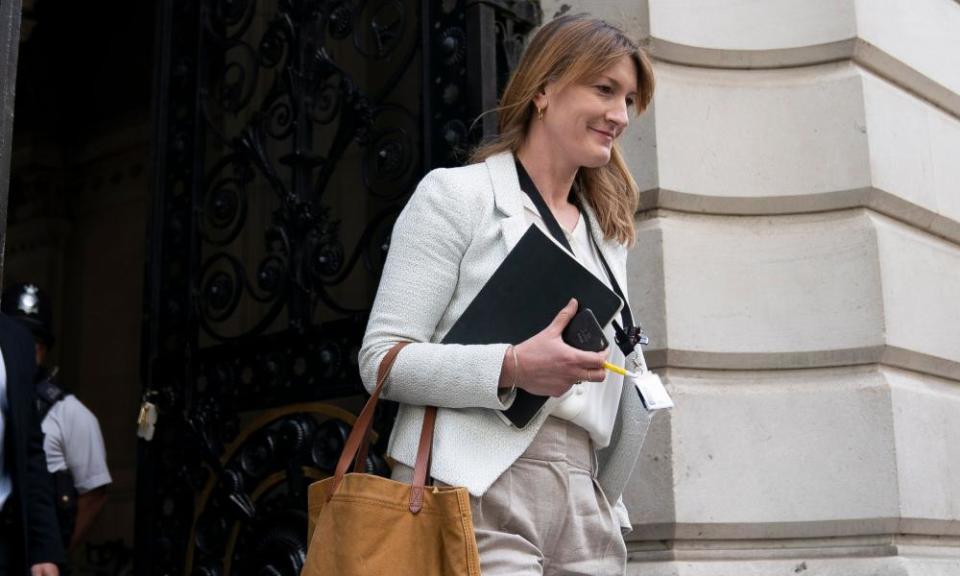Could being the face of Boris Johnson be the worst job in politics?

Westminster insiders on both sides of the aisle were in rare unanimity on Thursday: Allegra Stratton is taking on one of the toughest roles in government. “Awful job,” said one sympathetic Labour adviser.
The 39-year-old former broadcaster, currently an adviser to the chancellor, Rishi Sunak, will soon be formally announced as the face of Downing Street’s new televised daily press briefings, becoming a high-profile spokeswoman for the prime minister.
Her appointment follows months of speculation about who would take on the White House-style briefings after Downing Street announced the role in July. Discussing the creation of the televised briefings, Johnson said: “We do think that people want direct engagement and want stuff from us and so we’re going to have a go at that … I will pop up from time to time, I have no doubt.”
A senior Conservative claimed Johnson had personally asked Stratton more than once to become the public face of his embattled government before she finally accepted.
If Stratton did hesitate, it would be understandable. The new role will involve explaining the government’s every move, as it battles to get to grips with an unprecedented public health emergency.
When the public think of spin doctors, foul-mouthed Malcolm Tucker in The Thick of It probably comes to mind: but Peter Capaldi’s lovably loathsome character could exercise the dark arts of political communication behind closed doors. Stratton will be on public display, as political journalists quiz her about ministers’ latest missteps and manoeuvres.
And she arrives at a moment when the government is besieged by restive backbenchers sceptical about Covid restrictions, and facing fierce criticism over the way they are being communicated.
In the past 10 days alone, Johnson “misspoke” about restrictions in the north-east (after junior minister Gillian Keegan also couldn’t say what the rules were) and suffered a car-crash interview with ITV’s Hannah Miller in which he couldn’t say if Oldham faced tighter rules than the rest of Greater Manchester.
In the lobby briefing after Johnson’s bombastic “new Jerusalem” party conference speech on Tuesday, his spokesman faced a rough ride as every question from journalists seeking more detail about policies scattered throughout the speech – social care funding, 95% loan-to-value mortgages, digital IDs – were met with “you have the prime minister’s words”.
And on Thursday, leaked details of tougher curbs expected to be brought in across much of the north of England next week infuriated local leaders, who had not yet been properly consulted.
There are currently two daily lobby briefings for political journalists, which are on the record but take place behind closed doors. One of these will be replaced by the new televised briefing. Daily lobby briefings have been on the record – directly quotable by journalists – since Tony Blair’s director of communications Alistair Campbell sought to make them more accessible.
But they have continued to be held behind closed doors – most recently in 9 Downing Street, before coronavirus forced them to become virtual.
The briefings are currently taken by Johnson’s official spokesman, James Slack, the former Daily Mail political editor who did the same job for Theresa May. He is expected to be promoted to a more strategic role.
Stratton’s post is part of a shake-up masterminded by Johnson’s director of communications, Lee Cain, who is increasingly centralising government communications in Downing Street, and intends to significantly reduce the number of civil servants dealing with the press. Cain is having a large room in 9 Downing Street fitted out as a new broadcast studio for the briefings.
Downing Street hopes the public will warm to Stratton, and footage from the briefings will pop up in evening news bulletins, as clips from the daily coronavirus press conferences regularly did during lockdown.
Stratton is a Cambridge University graduate whose move to the chancellor’s director of strategic communications role in April followed a successful career in journalism.
She started out as a producer at the BBC, followed by a stint as a political correspondent at the Guardian. In 2012, she rejoined the BBC when she became Newsnight’s political editor. She was appointed national editor at ITV News in late 2015 and also co-presented ITV’s Peston on Sunday.
In a 2016 interview with the Telegraph, Stratton spoke about how she refused to take part in the infamous 2012 Newsnight broadcast that wrongly linked former Conservative party treasurer, Lord McAlpine, to false historical allegations of child sexual abuse.
“I was jogging, on my day off, when my editor called me on my mobile and asked me to come in and do a two-way in the studio,” Stratton recalled. “I thought about it a lot, but I was unconvinced by the story and, having raised my concerns, I decided not to take part. I was proved right, but I hesitate to say as much because that story ruined my editor’s career.”
In 2013, Stratton told the Evening Standard that her heroes were 19th-century author George Eliot, ex-BBC journalist Stephanie Flanders and comedian, actor and writer Tina Fey. Asked if she had ever had a run-in with the police, she told the newspaper: “Yes, but I was with them not against them. It was in the aftermath of the riots and some chippy kids were trying to start a fight with the police and I stepped in to defend them.”
She also cited her favourite discovery as the cupboard in the House of Commons crypt where suffragette Emily Davison hid on the night of the 1911 census so she could say that her address was “the House of Commons”.
Stratton married James Forsyth, the political editor of the Spectator magazine, which the prime minister used to edit, in 2011 at a ceremony where Sunak was the best man.

